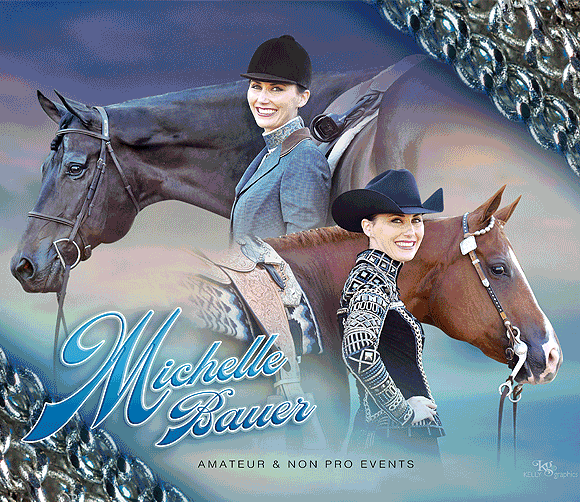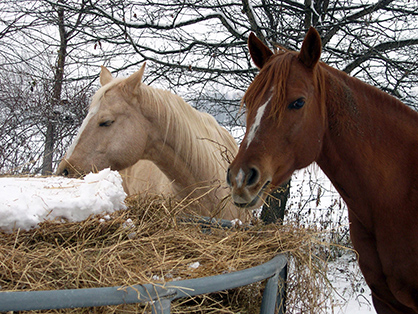Fine Tuning Winter Feeding
Plenty is written every year about the basics of winter feeding, including:
- Lots of hay/fiber
- Increase calories to compensate for energy lost staying warm
- Feed salt
- Constant water at a comfortable temperature for drinking
These things are critically important for all horses, to help prevent weight loss and impaction. However, it doesn’t stop there for special needs horses.
Low moisture winter feedstuffs are also a risk factor for choke in older horses in general, especially if their chewing efficiency is poor. Soaking meals helps, but isn’t always enough when the horse does not chew well. The saliva produced during normal chewing is rich in mucin which lubricates the food bolus on its way through the esophagus.
Adding psyllium to wet meals can help replace the lubricating effect of mucin. It has a very high soluble fiber content which adds a slippery/slimy texture to the food. That’s not particularly appealing to us, but horses eat it right up. Regular use of psyllium also has a prebiotic effect in the large intestine.
Speaking of the large intestine, for these high forage diets to do any good they have to be efficiently fermented. That takes a vibrant thriving population of organisms. There are many horses, older horses in particular, but younger ones as well, that do not handle high fiber hays well. A common sign of this is fluid leaking around formed manure. You may also see some bloating/distention and difficulty holding weight even with generous feeding.
 This can be turned around with prebiotics that easily digestible fiber, like the psyllium above, combined with high potency gut support. Digestive enzymes (lipase, protease, amylase) help insure that protein, fat and starch are digested and absorbed in the small intestine so they do not reach the large intestine where they can be disruptive to fermentation. High concentrations of active yeast and probiotic organisms as well as fermentation products produce a favorable environment for effective fiber fermentation in the large intestine.
This can be turned around with prebiotics that easily digestible fiber, like the psyllium above, combined with high potency gut support. Digestive enzymes (lipase, protease, amylase) help insure that protein, fat and starch are digested and absorbed in the small intestine so they do not reach the large intestine where they can be disruptive to fermentation. High concentrations of active yeast and probiotic organisms as well as fermentation products produce a favorable environment for effective fiber fermentation in the large intestine.
One of the most difficult situations to handle is the horse that still cannot maintain a healthy weight despite high rates of feeding and digestive tract support. The horse does not have to be grossly fat to benefit from the heat conserving effects of a normal fat layer. Enough fat to cover the ribs and keep the bones from obviously protruding will do it.
If your horse cannot maintain that much weight, the cold will be much harder on him. Grains are the next step up in terms of calorie density, but some horses do not tolerate them well for metabolic reasons, while others pass too much undigested into the large intestine where it causes more harm than good.
Supplemental fat can be the solution. Caloric density is very high and converting dietary fat to body fat is done efficiently. Coconut oil is particularly easy to metabolize and is by far the most appetizing. Even cats can’t resist it! Incorporating flax oil or full fat flax or chia seeds also replaces key essential omega fatty acids lost when grass is cured to make hay. New choices, like high oleic sunflower oil, are both metabolically healthful and compatible with maintaining a good omega fatty acid profile in the diet.
Uckele Health & Nutrition, maker of CocoSoya®, offers formulas to support winter nutritional needs.
Psyllium is a great fiber source as a bulking and binding agent. It forms a gelatinous mass that helps keep waste moving through the intestines and prevents blockages such as those caused by sand.
CocoEQ Family: CocoSoya®, CocoOmega, and CocoSun Oils and Granulars. Healthy fats benefit weight gain or maintenance simply because they are very calorie dense. Omega 3 and 6 fatty acids can help manage hard or easy keepers and improve the appeal of any meal while boosting the shine of skin, coat, and hoof quality.
Absorb All supports the intestinal tract to promote healthy gut flora, proper gut pH, and digestive and bowel health. Combines high levels of digestive enzymes, beneficial Probiotics, and microbial fermentation ingredients.











